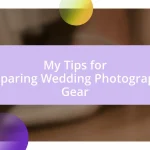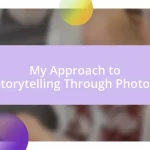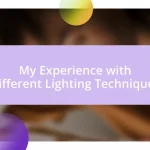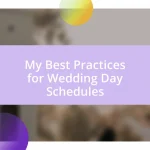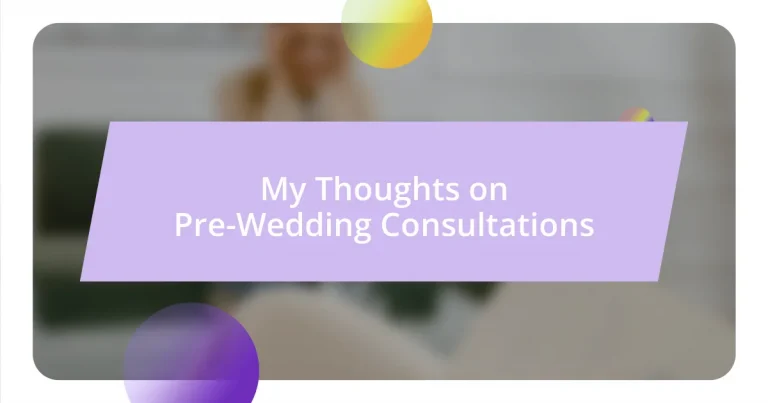Key takeaways:
- Pre-wedding consultations help couples clarify their vision, address concerns, and foster trust, making the planning process more meaningful and less stressful.
- Common discussion topics include vision and theme, budgeting, and logistics, all of which are essential for a successful wedding day execution.
- Post-consultation follow-ups are crucial for maintaining momentum, summarizing key points, and expressing excitement to energize the planning collaboration.
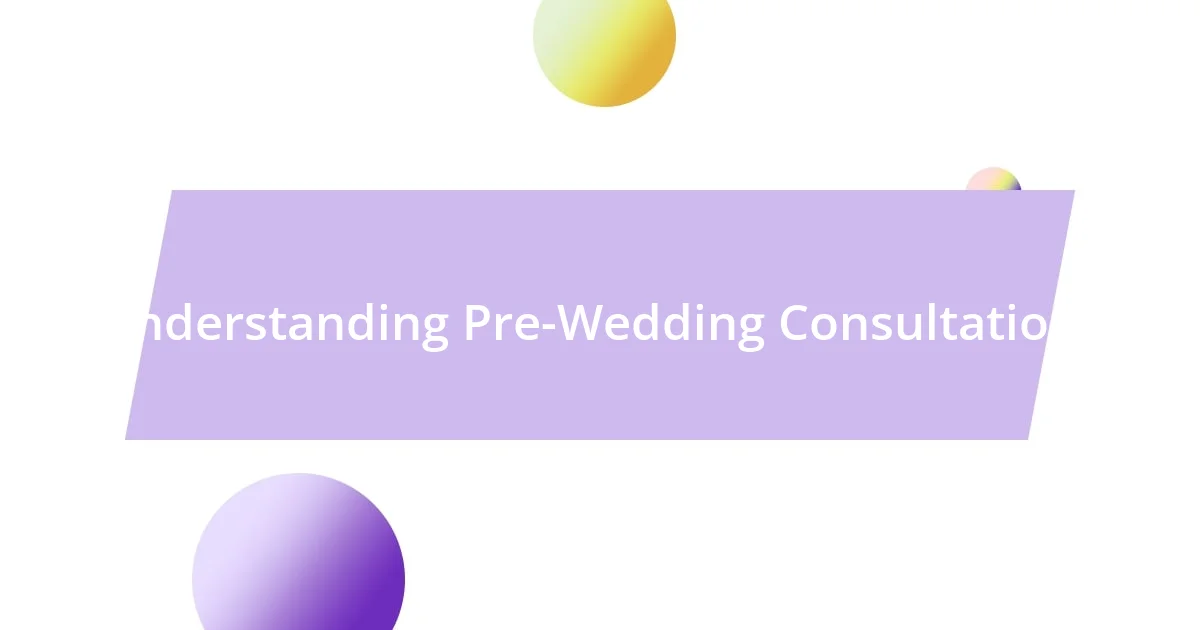
Understanding Pre-Wedding Consultations
Pre-wedding consultations serve as a crucial foundation for couples embarking on their wedding journey. From my experience, these meetings create a space where couples can voice their dreams and concerns, setting the tone for the entire planning process. I remember a couple I worked with who were initially overwhelmed by choices; through our consultation, they found clarity in their vision.
During these consultations, I often find that emotions run high. It’s not just about contracts and timelines; it’s about understanding what truly matters to couples. Have you ever felt pressure to meet everyone else’s expectations? In one instance, a bride candidly expressed her fear of disappointing her family, and together we navigated her priorities, ensuring her wedding reflected her authentic self.
Getting to know the couple on a more personal level during these sessions is invaluable. It allows for tailored recommendations, turning abstract ideas into tangible plans. I always ask questions that prompt them to dig deeper into their preferences and values. What do they both cherish most as a couple? This dialogue fosters trust, making the planning journey not just organized but incredibly meaningful.
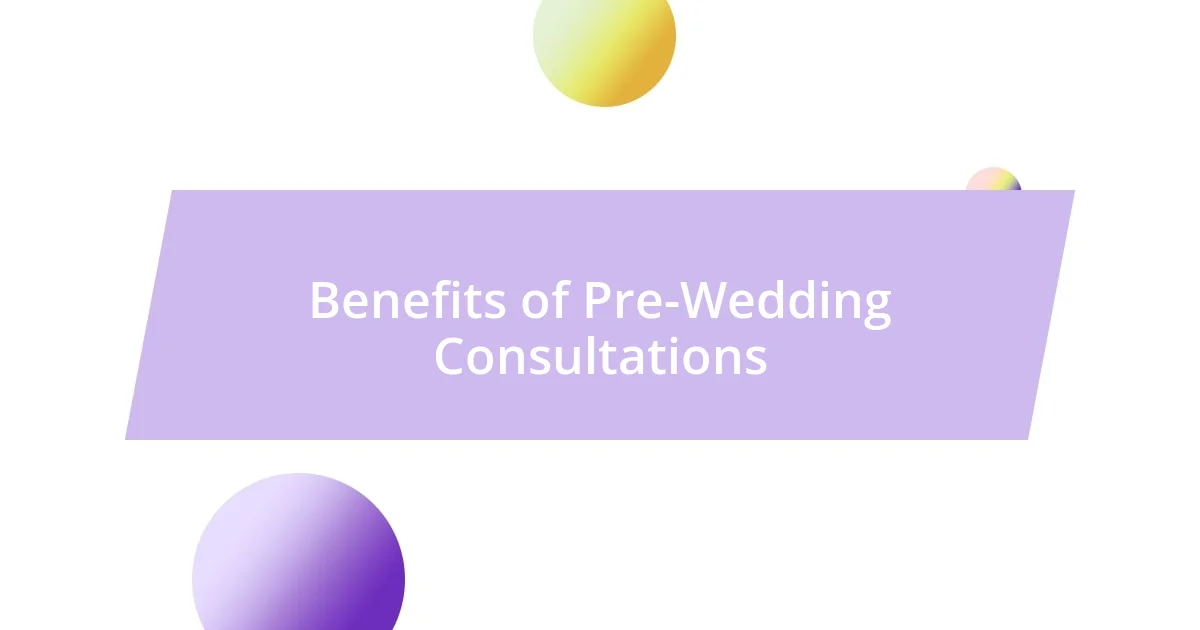
Benefits of Pre-Wedding Consultations
The benefits of pre-wedding consultations are profound and far-reaching. I’ve seen how these sessions can alleviate a couple’s anxiety. One couple I remember walked in feeling like they were juggling a million tasks. By the end, we had crafted a framework that gave them direction and a solid plan, turning their stress into excitement.
- Tailored guidance that reflects the couple’s unique vision.
- Improved communication, allowing couples to express their feelings and expectations.
- Strengthened bonds, enabling couples to collaborate while addressing potential conflicts.
- Early identification of logistical challenges, resulting in more effective solutions.
- A deeper understanding of each partner’s priorities and values, fostering harmony throughout the planning process.
Ultimately, it’s about creating a shared journey filled with joy. I once had a groom share how relieved he felt after articulating his worries about the budget—just voicing it opened up a productive dialogue. This can transform pre-wedding stress into a unified mission that brings couples closer.
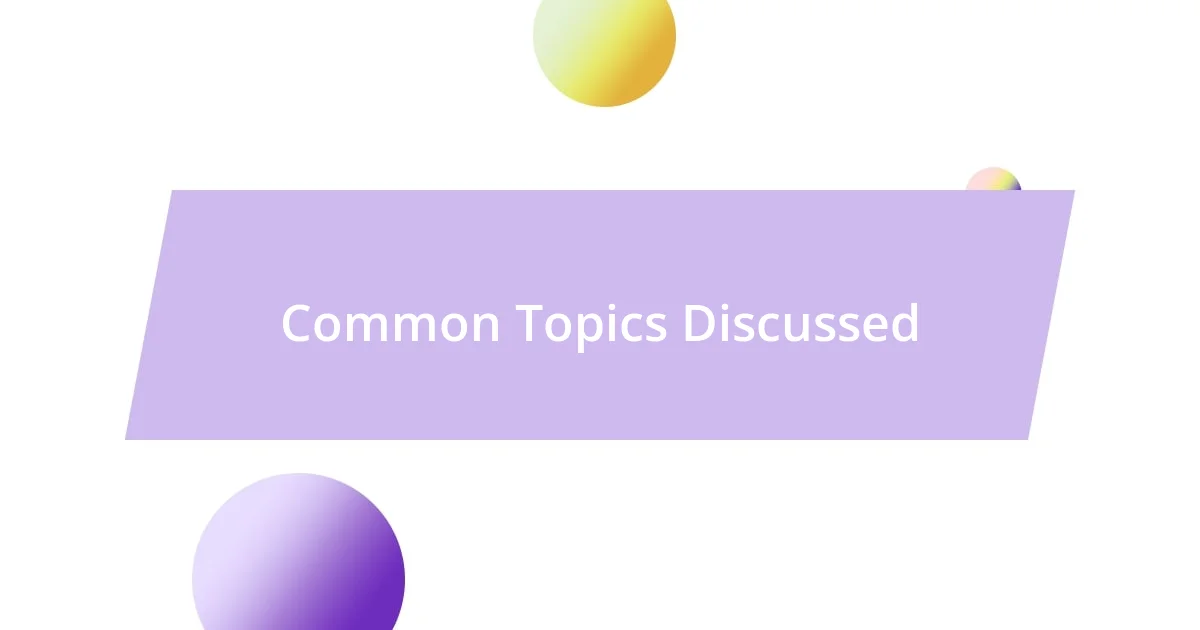
Common Topics Discussed
During pre-wedding consultations, couples often discuss their vision for the day. I remember a couple who had different ideas about the wedding theme. Through our conversation, they discovered a beautiful compromise that blended both of their tastes. This is just one example of how open dialogue helps uncover preferences that might otherwise clash if not addressed early on.
Another common topic revolves around budgeting. Couples often come in with a general idea but leave with a clearer understanding of how to allocate their resources. I once had a couple who worried about stretching their budget too thin, but through careful planning, we prioritized what mattered most to them, ultimately leading to a more satisfying experience. Honesty about finances is key; it not only eases stress but also empowers couples to make informed choices.
Logistics come into play as well. Understanding the timeline is vital for smooth execution on the wedding day. Personally, I’ve found that discussing potential pitfalls early—like venue capacity or vendor availability—allows couples to avoid last-minute surprises. It’s not just about the ‘what ifs’ but about creating a playbook that keeps everything on track while allowing them to focus on the joy of their celebration.
| Common Topic | Importance |
|---|---|
| Vision and Theme | Fosters collaboration and creativity, ensuring both partners are involved. |
| Budgeting | Provides financial clarity, reducing stress and making room for priorities. |
| Logistics | Helps create a structured plan, avoiding last-minute chaos on the wedding day. |
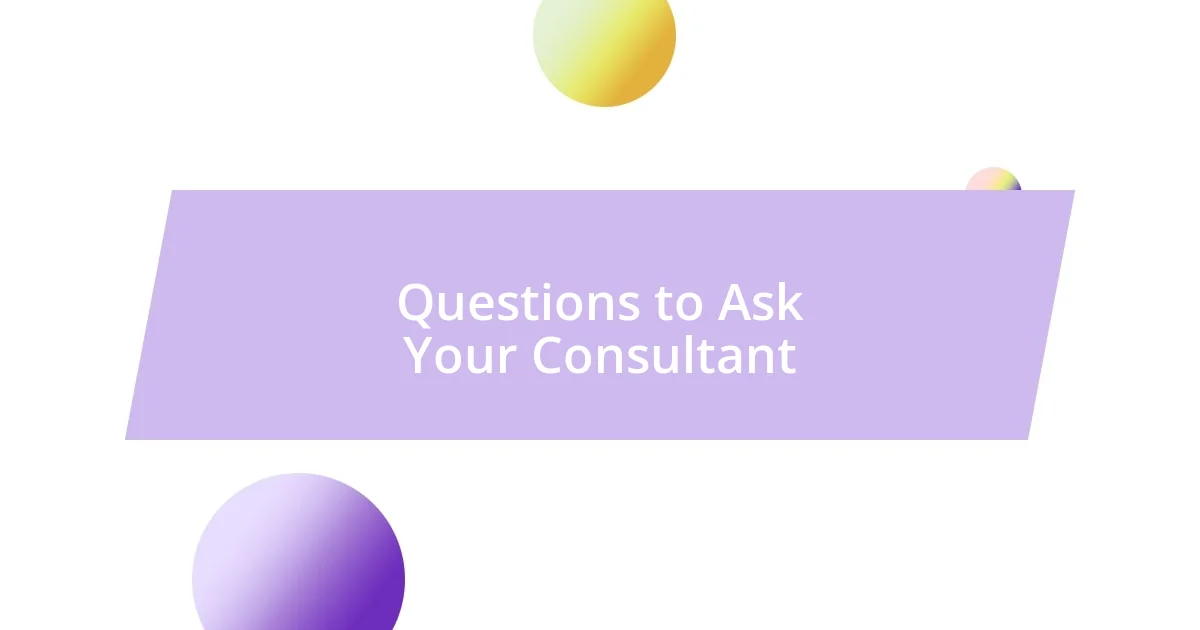
Questions to Ask Your Consultant
When you’re sitting down with your consultant, one of the first questions to ask is about their experience with weddings similar to yours. I remember asking this question during a consultation for my own wedding, and it revealed a lot about the consultant’s style and knowledge. The more specific you can get, the better you’ll understand how they can cater to your vision—after all, each wedding carries unique elements that make it special.
Another question worth exploring is how they plan to communicate with you throughout the planning process. I learned the hard way that not having a clear communication strategy can lead to misunderstandings and frustration. You might ponder: What if something important gets lost in translation? Asking how often they’ll check in with you or if they’re available for quick questions can really set the tone for a collaborative relationship and ease those pre-wedding jitters.
Lastly, don’t hesitate to ask about how they handle unexpected challenges. I had a friend whose consultant seamlessly adapted to last-minute changes when the weather turned, ensuring everything went off without a hitch. This made a world of difference for my friend and boosted her confidence that everything was under control. So, consider asking how they’ve navigated bumps in the road before—it’s revealing and helps you gauge how well they can support you on your big day.
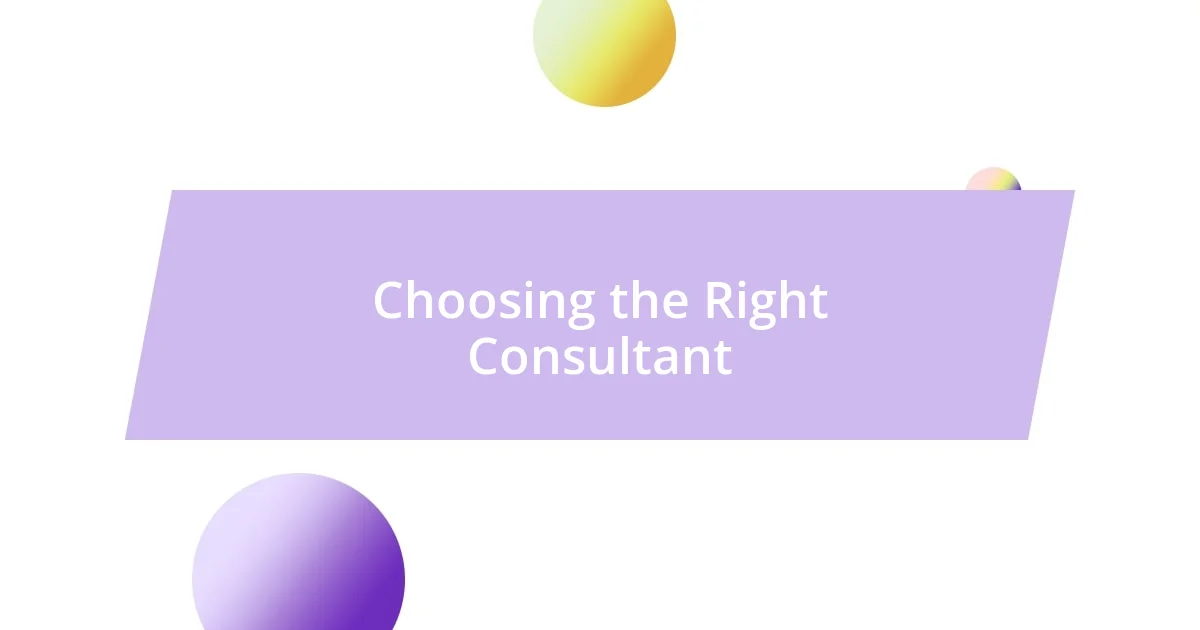
Choosing the Right Consultant
Choosing the right consultant can make all the difference in your wedding planning experience. When I was selecting a consultant for my friend’s wedding, we prioritized finding someone who not only understood her vision but also resonated with her personality. It’s essential to feel a personal connection; after all, this person will be guiding you through one of the most significant days of your life.
As you explore potential consultants, consider how they approach collaboration. I once met with a consultant who encouraged an open exchange of ideas, which made us feel like true partners in creating the wedding. It’s vital to ask about their process: How do they ensure that both partners’ voices are heard? This interaction can reveal a lot about how the consultant fosters creativity and manages differing opinions.
Finally, trust your intuition. I remember walking away from a consultation feeling energized and excited about the possibilities, while another left me flat and uninspired. It might sound cliché, but if something doesn’t feel right, don’t hesitate to keep searching. The right consultant should inspire confidence and enthusiasm, making you feel as if you’re embarking on an exciting journey together.
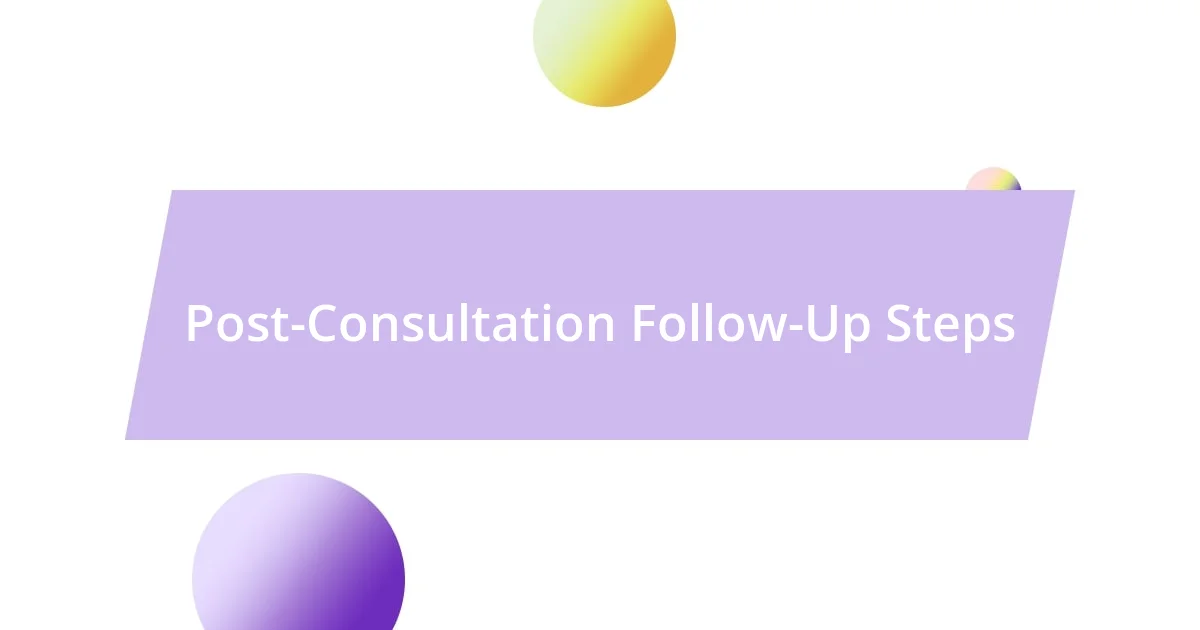
Post-Consultation Follow-Up Steps
Following your initial consultation, it’s important to reach out for a follow-up. I remember sending a quick thank-you email to my consultant after our first meeting. Not only did it show my appreciation, but it also opened the door for further dialogue about any lingering questions I had. A simple gesture can strengthen that initial connection and keep the momentum going.
Next, I recommend summarizing the key points discussed in your consultation. When I did this, it helped clarify my thoughts and ensure everyone was on the same page. In your follow-up, consider outlining the agreed-upon next steps. This establishes a shared understanding of how your planning process will unfold and demonstrates your commitment to making this partnership thrive.
Lastly, don’t shy away from sharing your excitement! Expressing how eager you are about your wedding vision can be incredibly motivating for your consultant. I found that when I conveyed my enthusiasm, it energized our collaboration and led to more creative ideas. So, why not kick off your follow-up with those positive vibes? It might just turn your planning process into an exhilarating experience instead of a stressful chore.






